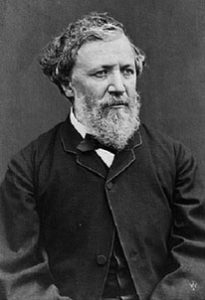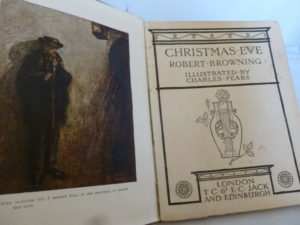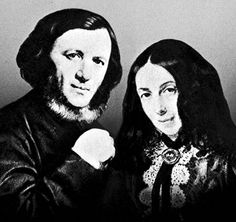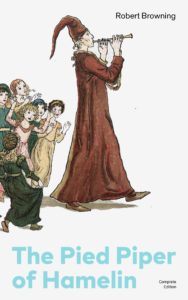Born in Camberwell and mostly self-taught for the cause that after the age of 14 he had almost no proper education. Browning is chiefly renowned for top of the dramatic monologue, a literary composition in which the character is discovered by the narrator.
Pauline was his first volume of poetry which came without signature in 1833. In the year 1835, he came into fame among the literary figures with the dramatic poem “Paracelsus”. The leading poem in which Browning used a Renaissance setting was “Paracelsus”.

His Dramatic Lyrics contained within the most famous “The Pied Piper of Hamelin”. Although a small number of Browning’s work were unsuccessful, it did not have an emotional impact much.
Christmas Eve and Easter Day
A poem by Robert Browning which is preserved as two poems rather than a lone poem separated into two parts. Subsequently his marriage to Elizabeth Barrett Browning.
It was the first fresh work of Robert Browning published by Chapman & Hall in the year 1850. As part of The Poetical Works of Robert Browning vol.4, it has been edited by Ian Jack, Rowena Fowler and Margaret Smith in recent years. And as a part of The Poems of Browning vol.3, the editing was completed by John Woolford, Daniel Karlin and Joseph Phelan.

‘Christmas Eve’ is an extended, erratically rhymed, octosyllabic poem in two folds. The poem is narrative mingling visionary and truthful rudiments.in this the narrator is taken to a Nonconformist church, to St. Peter’s in Rome, to a sermon theatre where the Christian myth was dispirited by a general practitioner of the higher censure.
For deific truth, denominational religion is obtainable as a flawed medium, and the inevitability of choosing one’s own finest manner for worship, is mostly put emphasis on.‘Easter Day’ on the other side is a channel of communication exploring the teething troubles of sustaining the reliance of the Christian and contends that suspicion is crucial to reliance.
‘Easter Day’ is basically a debate of Christian and a disbeliever the nature of faith.
Respected inklings to the religious thoughts of Browning himself is set in Christmas-Eve and Easter-Day.
Marriage to Elizabeth Barret
Born near Durham, England in 1806. Elizabeth enjoyed her father’s wealth and position, but suffered from weak lungs and tended to be isolated in her youth. September 12, 1846, the day Elizabeth Barrett eloped with Robert Browing.
At that time Barrett was already an appreciated poet. She had published poetry, literary criticism and Greek translations. The ‘Seraphim and Other Poems’ was her first volume of poetry which appeared in 1838, followed by ‘Poem’ by Elizabeth Barrett.
Her weakness accelerated after the death of her beloved brother in 1840. However, her poetry was well acknowledged and she also came in touch with Wordsworth and other renowned poets.
In the intervening time, when most of the works of Browning was criticised severely and excluded his works, Elizabeth Barrett walled it.

A letter of thanks was written to her by browning and was requested for a meet. Finally, she conceded after a long reluctance, and in no time the couple fell in love. Barrett’s father was doomed with this relation.
On September 12, 1846, Barrett sneaked out of the house while her family was away and met Browning at St. Marylebone Parish Church. There they surreptitiously got married. Before running with Browning to Italy, she reimbursed home for a week, keeping the marriage a secret. After that, she never gathered the courage to see her father again.
In Italy, they lived happily for fifteen years and a son was born into the family. The weak health of Elizabeth Barrett Browning also improved dramatically.
The views of the critics
In the poem Christmas Eve and Easter Day, critics could easily ascertain clear substantiation of the encouragement of the devout Christian faith of Elizabeth Browning. All his life, Browning had been seen fascinated in religion. The“atheism” was as seeming and impermanent as the vegetarianism which he gathered from Shelley.
An eye witness to his sense of the profound connotation of religion can be seen in early period poems namely Pauline, Paracelsus, Pippa Passes. Modern-day brashness towards Christianity: rebellion, the higher criticism, Roman Catholicism is dealt with in the poem Christmas Eve.
Easter Day is initiated to be more controlled and unyielding. Also, there is more search for truth and full of lyric beauty. The innermost nature of the faith is dole out with is religion.
It gives the enthusiasm to delight also it takes the resentment away from sorrow. Both poems are theatrical and none is to be looked upon as the confession of conviction of the poet. The insightful of his otherworldly convictions is also expressed through the poems.

George Santayana, as one of the critic, stated that Browning was strongly cognisant that the poetry was written by him in an age of science, of dynamic technology and of prose, above all prose fiction. The poetry was being strived with prose in these circumstances, inquisitiveness and glee in detail that remained a part of his personality.
Where other poets, notably Tennyson, wrote in a style that moved apart from and above preoccupations of daily living, Browning delighted in the idiom of ordinary speech and in peculiarities of mind and objects.
He was not the only practitioner of the dramatic monologue, but he is especially associated with it; he chose characters out of history or invented them and made them think aloud so as to display their distinctive mentalities.
Browning easily arouses and engages the reader by the pithiness of his moral judgement, the liveliness of his historical fancy. It is obvious that we are in the presence of a great writer, of a great imagination force of a master in the expression of emotion.
For many Browning was a creator into the subterranean mysteries of hunger and gave a means of absconding from the moral scarcity of their own lives and of the rhythmic and compulsive feeling of the general struggling which became the chief adherent of the attractiveness gained by browning.
Enthused by devotions was his art which was less simple and universal than the ends of mind’s eye itself. His performance of mind could not be at permission or pure successively. The imaginative impulse could not grasp its objective or manifest in its own gradual superlative at any prominent step.
The imaginings we have in delusion was purely a vent for personal preoccupations is entirely different from that of browning.
Browning intention in Christmas Eve
An inordinate deal of argument among the critics befallen regarding the purpose of browning in writing Christmas Eve being published in 1850 on April fool’s day, along with another poem named Easter day. The quote letters of Elizabeth to Robert were a foremost influencer to write poems.
These were very subjective, containing even his own religious opinions.it had been concluded by W.C Da Van that the one who is in control for browning writing this poem is Mrs.Browning in which he reviewed in an unswerving fashion and much personal.in this poem, he is seen conflicting the dramatic and objective aspect, unlike his other poems.
Conclusion
The poem “Christmas Eve” accompanying with “Easter Day”, although highly prized by a few give the impression not to have fascinated much from the readers of poetry.
In a countless measure, in order to be recognised, many would demand a significant degree of vagueness. But vagueness is the arrival which to a first glance may be obtainable either by perspicacity or negligence of thought.
Vagueness itself is striking to some people, from the hope that worthiness is the cause of it. The vagueness caused gives no right to readers to complain. It is also not that form of countenance which is most with no trouble implicit at first prospect.